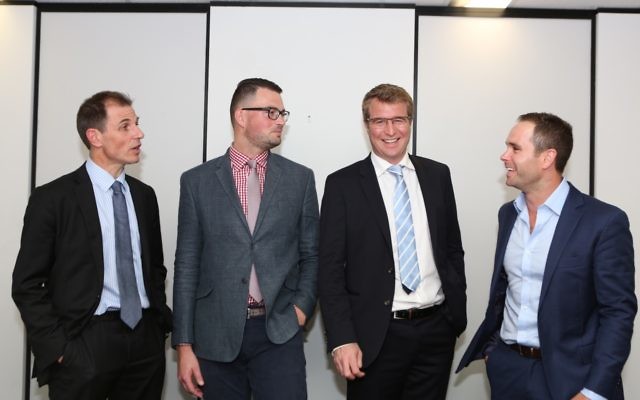Impressions of Israel
LABELLING Israel study tours “a junket or propaganda tour” – as former foreign minister Bob Carr did last month – is to completely misunderstand their nature and depth, Sky News political journalist David Lipson said earlier this month.
LABELLING Israel study tours “a junket or propaganda tour” – as former foreign minister Bob Carr did last month – is to completely misunderstand their nature and depth, Sky News political journalist David Lipson said earlier this month.
Lipson took part in the NSW Jewish Board of Deputies (JBOD) Study Mission to Israel in November, along with Daily Telegraph deputy editor Ben English, Seven News journalist Alex Hart and Fairfax political editor Bevan Shields.
The group was joined by a parallel Australia/Israel & Jewish Affairs Council (AIJAC) Rambam mission featuring security expert Professor Alan Dupont and senior writer Sharri Markson from The Australian, Herald Sun politics editor James Campbell and Australian Financial Review deputy editor Aaron Patrick.
Sharing his impressions at a JBOD event at the Sydney Jewish Museum, Lipson observed that “the [Israeli-Palestinian] conflict itself is just completely normalised”.
He said the Israelis “seem resigned” to it, while the Palestinians are “too tribal … too self-defeating to be able to find a pathway forward”.
He did however take aim at settlements, saying he’s not convinced they’re not an impediment to peace.
“I’m not saying that peace will be achieved if they are taken away … But I think it’s [their effect] probably underestimated,” he said.
Shields echoed that concern.
“There’s so many of them, it’s so complex, that reaching some mutually agreeable terms about land swaps and borders will soon become very near impossible,” he said.
He said there’s no “obvious path or direction for progress” on the peace process.
But he noted that “Israel’s story is more than just about conflict, there’s an incredible success story,” and expressed his positive impression of the country’s youth.
“Probably in the future a peace deal lies with them more than anyone else,” he said.
Hart said Israel – as the only stable democratic power – must be the driver in the peace process. “It can’t really be expected of the Palestinians … they’ve got no legitimate leader, no legitimate government, nor any prospect of it in the near term.”
He said unilateral withdrawal from the West Bank “perhaps should be considered” and the possibility of handing over the settlements “needs to be explored”.
English labelled Israel an “extraordinary nation in an extraordinary situation”.
“It really is a tapestry of conflicting images, ideas and emotions. And the sum of all that is a place brimming with energy and life,” he said.
In light of the recent stabbings, he said he arrived “expecting a nation on the edge”.
“But if there was tension I didn’t sense it. Jerusalem’s shops and streets bustled with activity,” he said.
The JBOD journalists mission is supported by the JCA Haberman Kulawicz Wolanski Fund.
Meanwhile, the AIJAC guests presented their impressions at a luncheon.
Patrick said the visit to Yad Vashem was a meaningful and moving experience, while Dupont highlighted Israel’s lack of strategic depth, but also the bonds developing with much of the Arab Sunni world based on common concerns, particularly Iran’s quest for regional hegemony.
Markson said she discovered a deep emotional awakening as an Australian Jew visiting the Kotel for the first time.
GARETH NARUNSKY


comments